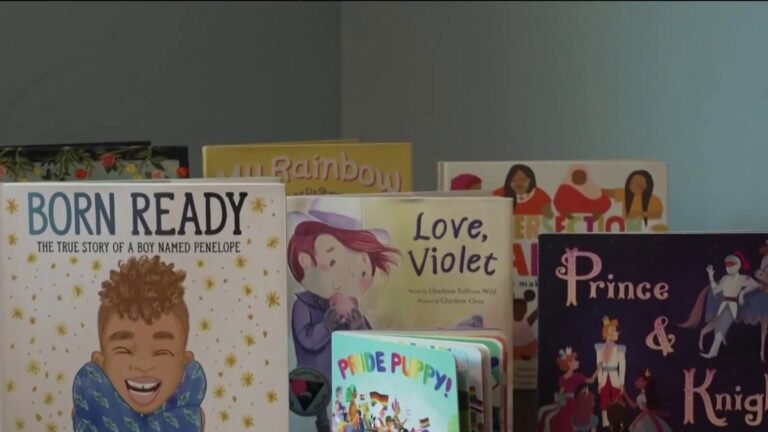Firing off an angry message on his social media platform, Trump labeled Zelensky a “dictator without elections,” blaming him for strong-arming the United States into spending hundreds of billions of dollars “to go into a War that couldn’t be won.”
It turned into a daylong series of taunts, which Trump amplified during a speech Wednesday night in Miami, where he declared: “Zelensky better move faster. He’s not going to have a country left.”
Both accusations parroted Moscow’s irony-laden talking points about the war and Ukraine’s president, who declared martial law at the onset of Russia’s invasion, which prevented scheduled elections.
Trump’s post was hardly an isolated attack. For years, Trump has viewed Zelensky skeptically, questioning his decisions and — in an episode made famous during Trump’s first impeachment — pressing him to open an investigation into his then-rival Joe Biden.
Trump has taken to weaving his criticism of Biden and Zelensky together, suggesting Wednesday night that the Ukrainian president was on a “gravy train” with US assistance during the Biden administration.
“If you would have had (Biden’s) administration for another year,” Trump said Wednesday night, “you would have been in World War III and it’s not going to happen now.”
Lately, however, Trump’s aides have been closely monitoring Zelensky’s public statements — in particular his criticism of the US excluding Ukraine from talks with Russian officials in Saudi Arabia this week — with mounting agitation.
Their frustration had been growing before Wednesday, the sources said. But it boiled over after Zelensky told reporters at his office in Kyiv that Trump was living in a “web of disinformation.”
Trump privately told aides who were with him in Florida that he wanted to respond directly, which led to his Truth Social post, an official traveling with Trump said. He delivered the diplomatic missile on the way to his golf club in Miami and expanded on his remarks before an audience of hundreds at the evening investment conference in Miami sponsored by the sovereign wealth fund of Saudi Arabia, which hosted talks earlier in the week between US and Russian officials.
“It’s a frustration. There is a strong and legitimate feeling that this brutal war has to stop and that this pathway is being diminished through Zelensky’s public statements,” a second White House official told CNN.
In Zelensky’s view, however, the end to the war Trump is envisioning looks a lot like what Russia has been asking for. Already, members of Trump’s administration have ruled out NATO membership for Kyiv and said US troops would not help guarantee Ukraine’s security when the war ends.
For those reasons, he says he can’t help but speak out.
For months, Zelensky had carefully sought to avoid a full rupture with his temperamental new counterpart in Washington. He arranged a meeting in the weeks ahead of last year’s election meant to allay some of the then-GOP nominee’s skepticism about US involvement in the war.
The men emerged at the start of the discussion at Trump Tower in Manhattan to demonstrate their willingness to get along. Trump said he had a “very good relationship” with the Ukrainian leader — but that he also enjoyed a “very good relationship” with his adversary in Moscow, Vladimir Putin.
“I hope we have more good relations,” Zelensky interjected.
“But, you know, it takes two to tango,” Trump replied.
At the time, the exchange hardly registered. Five months later, it appears to foretell the remarkable rift that is emerging just as Trump looks to sit down with Putin in Saudi Arabia.
Signaling a shift in American policy
Few foreign leaders have been immune to Trump’s mood swings, which during his first term led to scrapped overseas trips, phone calls that ended abruptly when Trump hung up, and the imposition of tough new tariffs.
Yet until now, Trump’s frustrations hadn’t seemed to signal such a wholesale shift in American foreign policy, away from the United States’ longstanding allies in Europe and toward the Kremlin.
Many of Trump’s allies said Zelensky should have seen Trump’s wrath coming.
“The idea that Zelensky is going to change the president’s mind by badmouthing him in public media, everyone who knows the president will tell you that is an atrocious way to deal with this administration,” Vance told The Daily Mail.
In explaining Trump’s striking public statements, White House officials have insisted his primary – in fact, only – objective is to end the three-year conflict in Ukraine, which he believes was woefully mismanaged by the previous administration.
Insisting upon a settlement to the war, they say, is long overdue after years of grinding conflict. Trump himself has appeared almost agnostic on the precise contours of the settlement that would end the war: “I don’t care so much about anything other than I want to stop having millions of people killed, killed,” he said last week.
Yet how he achieves that objective while castigating Zelensky and aligning himself with Russian talking points isn’t clear.
Trump’s Republican allies in Washington suggested Wednesday the president may have a grand plan in mind.
”What I’m in support of is a peaceful outcome and result in Ukraine,” Senate Majority Leader John Thune said when asked if he had concerns about the president’s rhetoric about Ukraine. Thune said he believed Trump and his team are working to achieve peace and “right now, you’ve got to give them some space.”
Sen. Kevin Cramer, a North Dakota Republican, said Trump is “always positioning for something,” adding that he suspected Trump might be “positioning for a negotiation” with Putin through his comments about Zelensky.
Still, Trump will require buy-in from Zelensky if any negotiated end to the conflict is successful. And if he is serious about keeping American troops out of the conflict, he’ll need European allies to step up with their own peacekeeping troops — a step some nations have already offered.
Some Trump advisers and allies do see a strategy in the bluster. A Trump loyalist who has spoken to the president in Florida in recent days said one reason behind Trump’s lashing out at Ukraine is to scare Europe into ponying up more to defend Ukraine.
“See, there’s a method to the madness,” the person said, pointing to a report that Denmark had pledged to boost spending on arms.
A Trump advisor echoed that sentiment on Wednesday, telling CNN: “If other European countries are half as responsive as Denmark, then that’s a massive win.”
Writing on X, former British Prime Minister Boris Johnson — who maintained close ties with Trump during his first term — rebutted most of Trump’s claims but said his former counterpart was driving a larger point.
“When are we Europeans going to stop being scandalized about Donald Trump and start helping him to end this war?” Johnson wrote. “Of course, Ukraine didn’t start the war. You might as well say that America attacked Japan at Pearl Harbor. Of course,e a country undergoing a violent invasion should not be staging elections. There was no general election in the UK from 1935 to 1945. Of course, Zelenskyy’s ratings are not 4%. They are actually about the same as Trump’s.”
“Trump’s statements are not intended to be historically accurate but to shock Europeans into action,” he went on.
Indeed, hastily arranged conferences of European leaders in Paris this week hosted by French President Emmanuel Macron suggested Trump’s words were being taken very seriously.
“Russia poses an existential threat to Europeans,” Macron said in an interview with French regional newspapers. “Do not think that the unthinkable cannot happen, including the worst.”
At the same time, Macron is not giving up on Trump entirely. He will be in Washington next week for a meeting, as will British Prime Minister Keir Starmer, who has said he would be willing to send troops to act as peacekeepers in Ukraine.
Both men spoke to Zelensky on Wednesday following Trump’s insults.
“The Prime Minister expressed his support for President Zelenskyy as Ukraine’s democratically elected leader and said that it was perfectly reasonable to suspend elections during war time as the UK did during World War II,” Downing Street said afterward.
Trump is increasingly casting himself in the role of peacemaker – no matter the cost – overlooking the frayed western alliances and the upending of US foreign policy.
“We’re successfully negotiating an end to the war with Russia, something all admit that only Trump is going to be able to do,” Trump said Wednesday night, speaking about himself again and again in the third person.
“In the Trump administration, we’re going to be able to do it. I think Putin even admitted that.”














